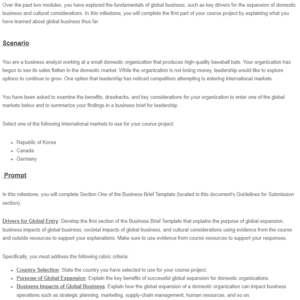Drivers for Global Entry – Germany
Country Selection
Although the business is making a profit currently, there is a window for expansion into the German market. One key benefit of the expansion is the likelihood that the business will make more money from the global market (Naz & Ahmad, 2018). The business will also benefit from an expanded talent pool in Germany. Other benefits include improved reputation, diversified markets, and access to new investment opportunities.
Purpose of Global Expansion
In a broader perspective, the key drivers of globalization include financial, political, technological, social, and economic factors. Economic factors may include lower trade and investment barriers (Naz & Ahmad, 2018). Significantly, the company will leverage Germany’s E.U. membership to benefit from cheaper raw materials from other E.U. member countries. On the other hand, political factors are the policies designed to promote international trade.
Business Impacts of Global Business
A business that moves to a global environment experiences political changes. By globalizing, businesses become part of trade agreements in their host country (Ristovska & Ristovska, 2014). For instance, membership in free trade agreements such as NAFTA and the European Union opens up more market opportunities for the business.
Besides, businesses that globalize experience expanded technological advancement. As a result, they can compete with larger international businesses (Ristovska & Ristovska, 2014). Technological tools such as the Internet allow companies to access information, regardless of their size or location.
Societal Impact of Global Business
Business globalization enables people to access new cultures. That includes access to information, goods, and art. For instance, it is through globalization that a consumer can stream a UK-made movie from the US through Netflix. Besides, globalization improves the standard of living among people from developed countries.
Cultural Considerations for Global Business
The cultural differences between countries affect business communication. These differences border around low-context and high-context cultures. For instance, in the US (high context culture), communication is often explicit. The case is different for low-context cultures like Russia, where communication is implicit.
Cultural differences also affect workplace interactions. Some of the differences between cultures include cheek kisses, hugging, and handshaking. It is important to research the country the business will join to achieve professional and successful interactions.
References
Naz, A., & Ahmad, E. (2018). Driving Factors of Globalization: An Empirical Analysis of the Developed and Developing Countries. Business & Economic Review, 10(1), 133–158. https://doi.org/10.22547/ber/10.1.6
Ristovska, K., & Ristovska, A. (2014). The impact of globalization on the business. Economic Analysis, 47(3-4), 83-89.
Over the past two modules, you have explored the fundamentals of global business, such as key drivers for the expansion of domestic business and cultural considerations. In this milestone, you will complete the first part of your course project by explaining what you have learned about global business thus far.

Drivers for Global Entry – Germany
Scenario
You are a business analyst working at a small domestic organization that produces high-quality baseball bats. Your organization has begun to see its sales flatten in the domestic market. While the organization is not losing money, leadership would like to explore options to continue to grow. One option that leadership has noticed competitors attempting is entering international markets.
You have been asked to examine the benefits, drawbacks, and key considerations for your organization to enter one of the global markets below and to summarize your findings in a business brief for leadership.
Select one of the following international markets to use for your course project:
- Republic of Korea
- Canada
- Germany
Prompt
In this milestone, you will complete Section One of the Business Brief Template (located in this document’s Guidelines for Submission section).
Drivers for Global Entry: Develop the first section of the Business Brief Template that explains the purpose of global expansion, business impacts of global business, societal impacts of global business, and cultural considerations using evidence from the course and outside resources to support your explanations. Make sure to use evidence from course resources to support your responses.
Specifically, you must address the following rubric criteria:
- Country Selection: State the country you have selected to use for your course project.
- Purpose of Global Expansion: Explain the key benefits of successful global expansion for domestic organizations.
- Business Impacts of Global Business: Explain how the global expansion of a domestic organization can impact business operations such as strategic planning, marketing, supply-chain management, human resources, and so on.
- Societal Impacts of Global Business: Explain how the global expansion of organizations has impacted society, citing specific examples regarding culture, transportation, employment, infrastructure, and environmental climate.
- Cultural Considerations for Global Business: Explain the importance of researching the culture of a potential global market prior to market entry, as well as key cultural considerations to explore to inform expansion decisions.

